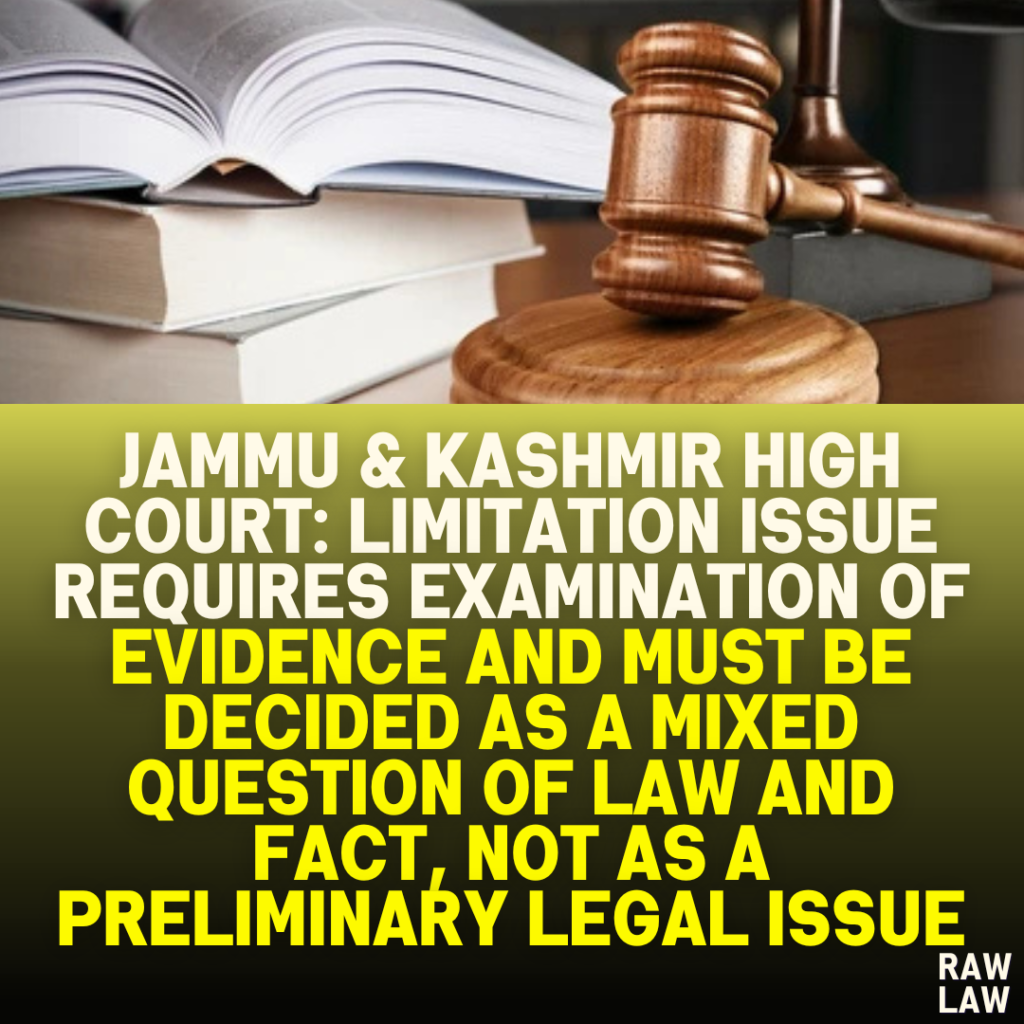Court’s Decision:
The Jammu & Kashmir High Court set aside the trial court’s order, which had treated the issue of limitation as a preliminary issue. The High Court held that the question of limitation is a mixed question of law and fact and must be decided based on evidence, rather than as a purely legal issue.
Facts:
The petitioners filed the present petition to challenge an order dated 09.08.2011 passed by the learned Munsiff Katra. In that order, the trial court dismissed an application filed by the plaintiff for deciding the issue of limitation alongside other issues in the case. The plaintiff had claimed inheritance of properties under a Will executed by Wazir Baij Nath on 02.04.1993, registered after the death of Baij Nath on 12.07.2000. The issue arose concerning the timeline of the plaintiff’s knowledge of the Will.
Issues:
The main issue before the court was whether the issue of limitation could be treated as a preliminary issue or whether it should be decided after considering the facts and evidence.
Petitioner’s Arguments:
The petitioners argued that the trial court had erred in treating the issue of limitation as a legal issue and deciding it preliminarily. The counsel for the petitioners cited two cases: Ali Dar & Anr. v. Rajab Dar & Anr., and Chhotanben v. Kiritbhai Jalkrushnabhai Thakkar. In these judgments, it was held that the issue of limitation is a mixed question of law and fact and must be decided after consideration of the evidence.
Respondent’s Arguments:
The respondent did not contest the petition and was proceeded ex-parte.
Analysis of the Law:
The High Court noted that the trial court had passed the impugned order in a casual manner and without proper application of mind. The court emphasized that the issue of limitation is dependent on the date of knowledge of the relevant facts and must be decided based on evidence. The High Court relied on precedent to conclude that the trial court was wrong to treat the limitation issue as a purely legal matter.
Precedent Analysis:
The High Court referenced the cases of Ali Dar & Anr. v. Rajab Dar & Anr., and Chhotanben v. Kiritbhai Jalkrushnabhai Thakkar, which held that the issue of limitation is a mixed question of law and fact. These cases supported the petitioners’ argument that limitation should not be treated as a preliminary issue.
Court’s Reasoning:
The High Court reasoned that limitation issues involve determining when a party gained knowledge of the relevant facts, which cannot be done purely through legal analysis but requires examining evidence. The court found that the trial court had wrongly treated the issue as a legal one and failed to properly consider the mixed nature of the issue.
Conclusion:
The High Court set aside the trial court’s order and directed that the issue of limitation be treated as a mixed question of fact and law, not as a preliminary issue. The trial court was ordered to proceed accordingly and decide the issue after examining the relevant evidence.
Implications:
This ruling emphasizes that limitation issues should not be decided in isolation as preliminary matters but require a thorough examination of both legal and factual elements. It reinforces the principle that courts must carefully apply legal standards to fact-based questions in limitation disputes.




Pingback: Orissa High Court: 2336-Day Delay in Filing Appeal Unjustified Without Sufficient Cause; ‘Public Interest Does Not Override Statutory Limitations,’ Government’s Appeal Dismissed" - Raw Law
Pingback: Bombay High Court Upholds Mandatory Prior Permission for Appointments in Minority Colleges, Emphasizing Regulatory Oversight to Prevent Misuse of Privileges and Ensure Compliance with Education Regulations - Raw Law